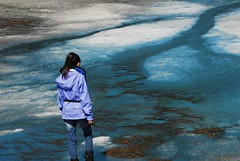Dido
I used to be so fearless so limitless and free
Happy on my own and nothing really bothered me.
I had desires to see the world, jump out of planes and fly
And I love to be alive but I was not afraid to die
I used to be so sure of things and self-contained
I could carry on with no need to explain
It didn't matter if I ever made it home
Could go too fast, and drink all night and dance alone
I love to be alive but I was not afraid to die
I love to be alive but I was not afraid to die
I used to be so thoughtless, so easy and free
Could walk away, not think ahead, and had no plans to keep.
No hand to told, no one to bring down with me.
I wouldn't see the worst and it only hurts me.
I love to be alive but I was not afraid to die
I've got everything to lose
Since I've met you
I've got everything to lose
I've got everything to lose
Picture: All Rights Reserved ® aml.2010
Tuesday, August 31, 2010
Saturday, August 28, 2010
Arahants, Bodhisattvas and Buddhas
Arahants Bodhisatvvas and Buddhas Essay by Bhikkhu Bodhi at Access to Insight
Thursday, August 26, 2010
Monday, August 23, 2010
looking in
English, which can express the thoughts of Hamlet and the tragedy of Lear, has no words for the shiver and the headache... Let a sufferer try to describe a pain in his head to the doctor and language at once runs dry.
Virginia Woolf
Virginia Woolf
Saturday, August 21, 2010
Friday, August 20, 2010
Wednesday, August 18, 2010
Monday, August 16, 2010
Dogen
To study Buddhism is to study yourself.
To study yourself is to forget yourself.
To forget yourself is to perceive your non-duality with all things.
To realize this is to cast off the mind and body of self and others.
Dogen
To study yourself is to forget yourself.
To forget yourself is to perceive your non-duality with all things.
To realize this is to cast off the mind and body of self and others.
Dogen
Saturday, August 14, 2010
Mind and Life XVIII
Mind and Life XVIII - Attention, Memory and Mind. Day 1 morning covers multitasking, meditation and contemplative practice.
The discussions during Mind and Life XVIII primarily focus on the subjective phenomenology, information-processing operations, and neural mechanisms of attention, memory and conscious awareness from both scientific and Buddhist perspectives. The conference was held at His Holiness's residence in Dharamsala, India in 2009 and organized by the Mind and Life Institute. (more info at www.dalailama.com, www.mindandlife.org)
Day 1 pm - An excellent presentation by Alan Wallace on shamatha
Day 2 am
Day 2 pm
Day 3 am
Day 3 pm
Day 4 am
Day 5 am
Day 5 pm
Thursday, August 12, 2010
Thanissaro Bhikkhu
Thanisarro Bhikkhu's June 2010 Saskatchewan Retreat on "The Ten Perfections"
All audio recordings and suggested readings are found here:
Saskatoon Retreat
All audio recordings and suggested readings are found here:
Saskatoon Retreat
Monday, August 09, 2010
What is downshifting?
While many are seeking to climb the material ladder in life, others have reached the upper rungs and found out it's not all it's cracked up to be; choosing to set a different course - downshifting.
Even if you haven't reached (what is generally considered) the upper rungs to discover this, if you're struggling in this economic climate to keep up with all the "gotta haves" that perhaps you really don't need; step back, take a deep breath, separate from the pack and consider downshifting. The environment will certainly benefit from you doing so.
Downshifting, a term currently used most often in Australia and the UK, is the concept of living in voluntary simplicity; usually with environmental sustainability in mind although not necessarily the focus or primary motivator. People who take the downshifting route are also called "post materialists".
While some have been making these changes for years, it's only relatively recently that downshifting has acquired the label. An Australian Institute survey in 2004 found that nearly a quarter of Australian adults aged 30-59 have chosen to downshift over the previous 10 years.
People downshift their lives for mainly 5 reasons:
a) A desire for a more balanced life with less stress
b) Clashes between personal values and those of the workplace
c) Wanting a more fulfilling life
d) Ill health
e) Environmental concerns/rejection of consumerism
Continue reading here
Even if you haven't reached (what is generally considered) the upper rungs to discover this, if you're struggling in this economic climate to keep up with all the "gotta haves" that perhaps you really don't need; step back, take a deep breath, separate from the pack and consider downshifting. The environment will certainly benefit from you doing so.
Downshifting, a term currently used most often in Australia and the UK, is the concept of living in voluntary simplicity; usually with environmental sustainability in mind although not necessarily the focus or primary motivator. People who take the downshifting route are also called "post materialists".
While some have been making these changes for years, it's only relatively recently that downshifting has acquired the label. An Australian Institute survey in 2004 found that nearly a quarter of Australian adults aged 30-59 have chosen to downshift over the previous 10 years.
People downshift their lives for mainly 5 reasons:
a) A desire for a more balanced life with less stress
b) Clashes between personal values and those of the workplace
c) Wanting a more fulfilling life
d) Ill health
e) Environmental concerns/rejection of consumerism
Continue reading here
Subscribe to:
Posts (Atom)

